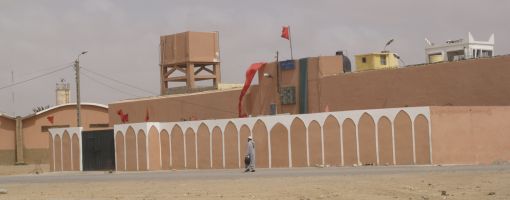Swedish Broadcasting: Prisoners on hunger strike for Western Sahara

Since end of February, Sahrawis in Moroccan prisons have been on hunger strike. For the most part they are political prisoners, protesting primarily the bad treatment they receive. Human rights organisations are now issuing warnings that the physical condition for some of the prisoners are worsening.
Published 25 March 2008
Sveriges Radio (Sweden),
24 March 2008
Approximately 60 prisoners from Western Sahara stopped eating about one month ago. They are in a number of Moroccan prisons, on various sentences, many of them because they are struggling for the Sahrawis' human rights.
Now, several of the prisoners have been taken to hospital suffering from acute problems in their intestines and liver and the like, according to a human rights organisation in Western Sahara. The lives of some of the prisoners is said to be in danger.
Also Amnesty is monitoring the development with great concern, and has a number of times criticized Morocco for detaining political activists, as well as for torture and disappearances.
Western Sahara is a desert strip of land along the Atlantic coast, which has been occupied by Morocco since the 1970's.
At an early stage, the UN made clear that the occupation is in direct violation of international law, and a majority of the Sahrawi population demands independence.
But the complicated conflict does not appear to reach a solution, as drawn-out UN negotiations so far have been fruitless.
The frustration among the Sahrawis is growing, as they experience severe repression. The striking prisoners demand independence for Western Sahara, and the release of political prisoners.
At the same time they protest against the ill treatment in the prisons, which includes rape and torture.
The political prisoners consider that they receive worse treatment than other prisoners.
A 21 year old Sahrawi prisoner, who was given a 5 year sentence for having taken part in a demonstration, and who is in jail east of the tourist destination Agadir, has through telephone been able to explain his situation. He told that he does not receive medication, access to TV, and visitors, which other prisoners are entitled to.
Moroccan authorities reject that their prison treatment is inferior, and claim that the Sahrawis are in prison because they have committed criminal acts.
Translated from Swedish by the Norwegian Support Committee for Western Sahara.
Hear the original Swedish Radio clip here. Reporting: Beatrice Janzon.
News
NY Check new Western Sahara poster!
“Try to Visit Western Sahara”…
10 July 2020
The Security Council fails Western Sahara and international law
On 31 October 2025, a new resolution was adopted in the UN Security Council calling on the Saharawis to negotiate a solution that would entail their incorporation into the occupying power, Morocco.
03 November 2025
Saharawis Demonstrate Against Trump Proposal
The United States has proposed in a meeting of the UN Security Council on Thursday that the occupied Western Sahara be incorporated into Morocco.
28 October 2025
Skretting Turkey misled about sustainability
Dutch-Norwegian fish feed giant admits using conflict fishmeal from occupied Western Sahara. Last month, it removed a fake sustainability claim from its website.
27 October 2025



